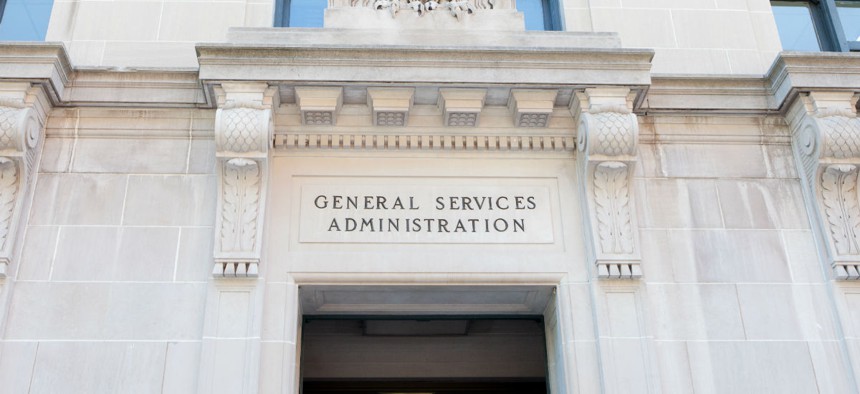
By Mark Van Scyoc / Shutterstock.com
IG Criticism of GSA Management Raises Questions About Agency's Ability to Take on OPM Functions
Trump administration reorganization plan calls for GSA to assume retirement services, health care and other HR responsibilities.
An agency watchdog blasted officials at the General Services Administration last week over “pervasive internal control weaknesses” across a variety of agency functions, raising questions about the agency proposed by the Trump administration to take over the core service functions of the Office of Personnel Management.
In an annual report on management challenges facing GSA in the coming fiscal year, Inspector General Carol Ochoa highlighted a number of areas where the agency needs to improve, from agency-wide internal controls to cyber security and procurement. GSA also must improve its ability to recover costs and fill critical jobs, the IG wrote.
“Internal control serves as the first line of defense in safeguarding assets and helping managers achieve desired results through effective stewardship of public resources,” Ochoa wrote. “In light of the pervasive internal control weaknesses identified in reports issued by our office and GSA’s independent public accountant, GSA management’s challenge is to implement a more effective system of internal controls to ensure the agency consistently complies with laws and regulations, produces accurate and reliable reports and operates effectively.”
Ochoa took the unusual step of publicly responding to GSA Administrator Emily Murphy’s agency response to the report. Although Ochoa acknowledged that the agency often has been responsive in reacting to findings from the inspector general’s office, she said GSA must develop a strategy to proactively address root causes of its management problems.
“Unless GSA recognizes that internal control is not one event, but a series of actions that occur throughout an entity’s operation and thereby proactively considers establishing a comprehensive system of internal control, these issues will likely continue to exist,” she wrote.
The inspector general also took issue with Murphy’s “misguided” contention that the IG's office should have raised the issue of internal controls throughout the year.
“GSA has active participation of senior leadership and the OIG in our internal control oversight team, the Management Control and Oversight Council,” Murphy wrote. “No significant internal control challenges have been communicated by the MCOC by the OIG in these meetings or in the monthly meetings between the inspector general, GSA administrator and deputy administrator.”
Ochoa responded: “It is our expectation that you and your senior leadership team will review [our] reports to gain an understanding of the deficiencies we identify across GSA. Second, while representatives of my office attend the MCOC meetings, they do so in an ex officio capacity as is proper and necessary to maintain our organizational independence. Lastly, it is well-established that management—not my office or the agency’s independent public accountant—is responsible for implementing an effective control environment.”
The inspector general also highlighted challenges associated with the first phase of the Trump administration’s plan to send most of OPM’s operating functions under the GSA umbrella: the HR Solutions fee for service program. By the end of March, GSA is expected to take control of the program and its more than 460 employees.
“Centralizing human resources operational functions in a single entity could attain considerable operational efficiencies,” Ochoa wrote. “However, GSA and OPM leadership will face challenges in transitioning the government’s human resources services with minimal disruption and without compromising the services provided.”
Among the possible stumbling blocks facing GSA is the need to train all erstwhile OPM employees on GSA’s systems, laws and regulations. There are other logistical issues, and there is still the question of whether the merger can be done without congressional action.
“GSA’s efforts will be further complicated by provisions in spending bills that restrict agencies from spending any money on reorganization plans without congressional approval,” the inspector general wrote. “During a July 2018 hearing before the Senate Homeland Security and Governmental Affairs Committee’s Subcommittee on Regulatory Affairs and Federal Management, GSA and OPM senior officials told lawmakers they are making progress with the planning phase to move HRS and do not believe they need congressional approval. However, members of Congress have stated that more detailed information and analysis are needed to allow for effective congressional oversight of the reorganization.”
For observers, the report raises further questions about whether shifting OPM’s functions, particularly retirement processing and administration of the Federal Employees Health Benefits Program, to GSA is a wise policy decision.
“For years, the [OPM] IG was telling OPM that they were vulnerable [on cyber security], literally since the 90s, so what happens?” said Jessica Klement, staff vice president for advocacy at the National Active and Retired Federal Employees Association. “Over 21 million people had their data stolen.”
Klement said that the report could be seen as undercutting one of the key arguments for the merger: that GSA could find innovative solutions to longstanding deficiencies in how OPM administers its programs.
“This transfer would not only risk that important federal programs receive insufficient attention and resources when folded into a larger organization, but also that they will not be overseen with proper internal controls to protect against mismanagement,” she said. “These programs impact over 8 million employees, retirees and their dependents, and GSA is in no position to undertake these vital functions.”







